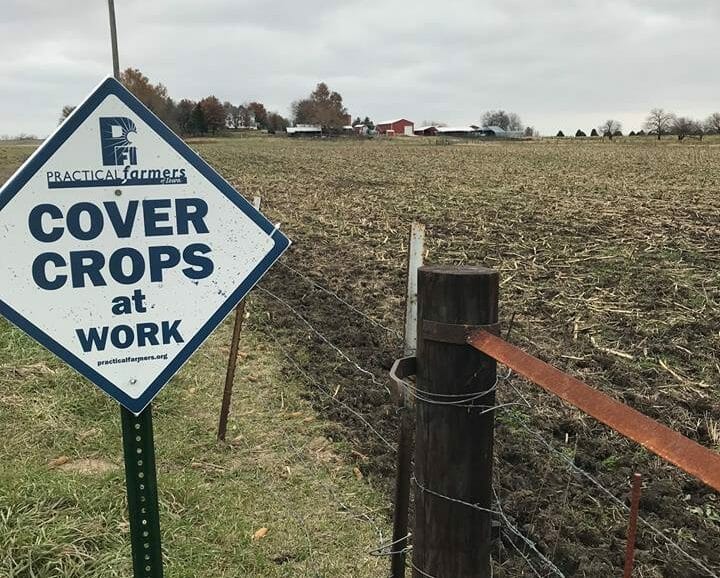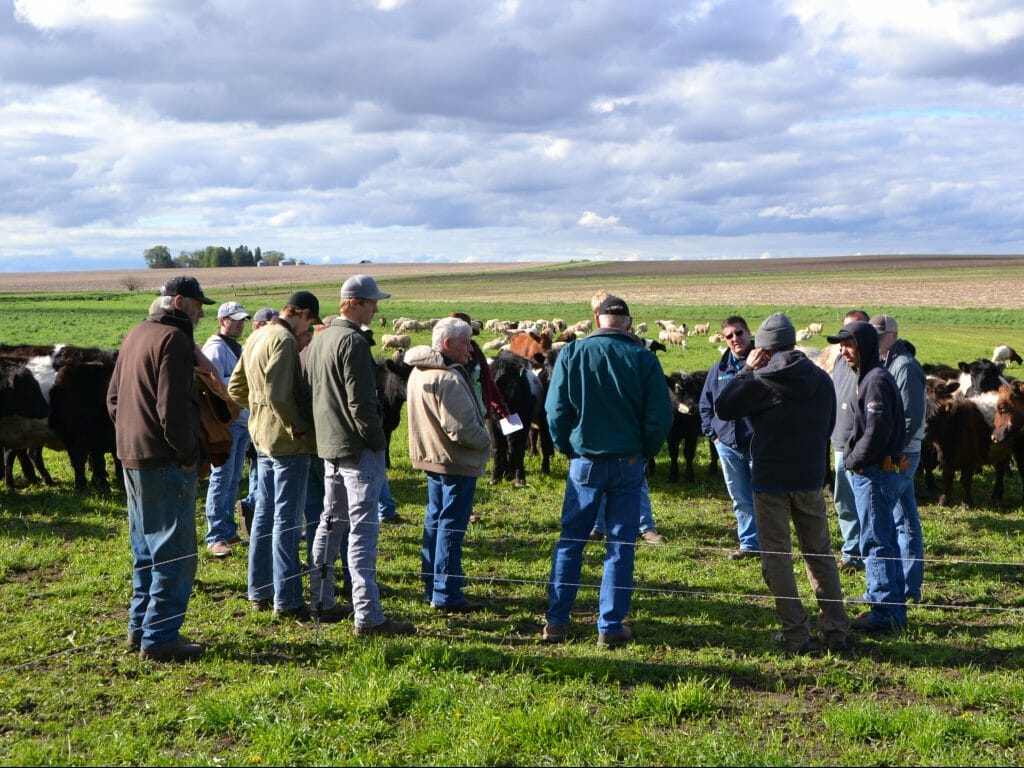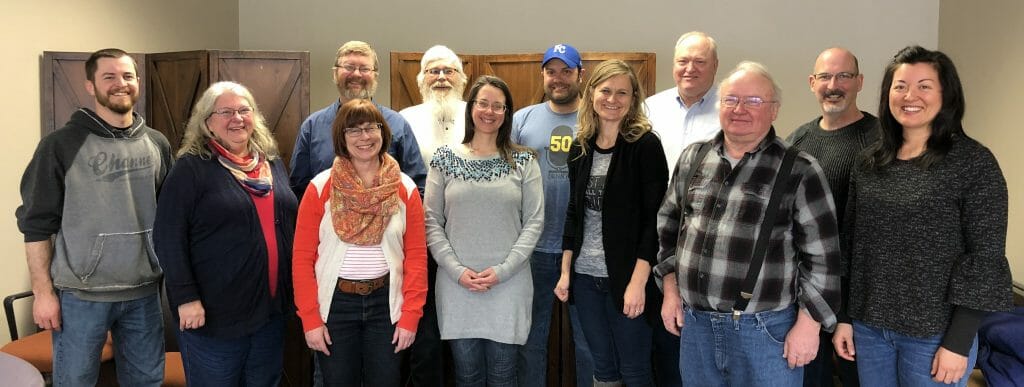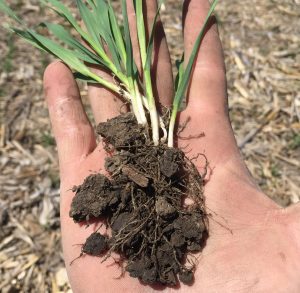How We Work: Making it Easy and Paving the Way
Change is never easy, but there are some things we can do as a member-led organization to make acting on the things we care about a little bit easier. The PFI farmer-led model has been the driver of our work since our inception. Our founders knew the challenges of acting and creating change first-hand, but they believed in the collective wisdom of their farming friends and neighbors. Sharing successes and challenges to the barriers they faced created a community of information sharing and innovation. Each conversation made it a little easier to act…to do…to change.
Making it easy
For Practical Farmers of Iowa, making it easy for people to act requires us to explore the barriers that impede well-intended individuals from acting, and work to diminish those barriers. We all know these barriers well — time, money, lack of information — these are a few that we all face from time to time. But barriers can be personal too — each individual may have different reasons for not acting on things they genuinely care about. Teasing out what those barriers might be from a membership that is 3,600 strong takes a coordinated and diverse effort. We believe the best way is to get together and listen.
Through our frequent and free public events held all over the state and small gatherings like regional grazing groups or beginning farmer listening sessions, we offer convenient and interesting ways to uncover barriers and discover solutions. We want to hear from our members about how we can make change possible for them. But since time is such a big challenge for all of us, we have additional ways to glean that information and to make it more convenient.
Our member survey is one example. Every three years, we ask our members to complete an online survey that collects information on who they are and how we can serve them better. That survey provides rich context for the work we do and how we do it. Our next member survey will be conducted at the beginning of 2020. If you are a PFI member, I highly encourage you to participate. This is just one way our members can make a difference in guiding our work — and we make it easy, you don’t even need to leave your home!
We also schedule our events throughout the year to account for the ebbs and flows of the farming season and offer convenient ways to act — even in the winter months. Snowed in? Watch a farminar, or PFI video series, or just peruse our website for articles and research that is relevant to you. Our website is loaded with resources to help inform you, and hopefully make acting a little bit easier.
Today, PFI offers a variety of ways to be a part of our community of change — read the Practical Farmer magazine and share your thoughts with a neighbor or friend, host a field day, be an outreach leader, join an email discussion list, participate in on-farm research, volunteer, host a social, become a lifetime member, serve on the board.
No role is too big or too small. By making it easy to get involved at any level you desire, we hope to create opportunities for change that will inspire you and others to think, “Well, that wasn’t so hard. Now what?” How each member decides to be involved in PFI and incorporate changes to their own farms will vary. Our job is to clear the path.
Remembering to act
However, a clear path involves more than just information sharing. We have to remember to act. Have you ever left your reusable shopping bags in the car, forgot to renew a membership, signed up for a community event and then got busy and forgot to go or intended to plant cover crops in the fall but didn’t get all the important decisions made in a timely manner to make it a reality? Me too.
While our intentions can be good, our follow through can be lacking. Prompts can be visual or auditory reminders to act on something we had already intended to do — it’s just a bit of a nudge. You may have noticed we do a bit of prompting at PFI. “Time to renew your membership!” is one that comes to mind. Our frequent contacts with our members through Practical News (PFI’s weekly e-newsletter), email reminders, discussion list posts, Facebook and events all create various avenues for PFI to reach our audience.
These nudges are not just for membership prompts, but reminders for things to think about for your farming systems. Last March, PFI staffer Alisha Bower published a blog titled, “Replant Decisions for Small Grains”. A late planting and bitter cold left small grains farmers wondering if their winter small grains would still be viable. The blog served as a farmer-led prompt for timely considerations on next steps. PFI’s cover crop decision tree is another example of a resource designed to prompt cover croppers (and aspiring cover croppers) on important decision and dates.
Of course, we look for opportunities to use prompts all across Iowa — no membership required!

New cover crops at work signs provide a prompt to farmers driving past to get their cover crops planted.
What’s in it for you?
Even if we remember to act and it is easy to do so, it never hurts to ask, “What’s in it for me?” That is not to say that our PFI community is solely driven by concerns for their own personal gain, we have many member stories that reflect a desire to contribute to a common good. But knowing that a certain act or change to a system will have personal benefits is certainly a motivator and it can be the factor between thinking about changes and acting on changes.
Examples of an incentive-based programs at PFI are cover crop and small grains cost-share. There is a lot of research on how cover crops benefit the soil by keeping it in place and providing roots in the ground all year long, and how small grains add diversity — creating a more resilient system. But because the economic benefits vary between systems and farms, financial incentives to plant cover crops or small grains can be a way to nudge the “Maybe” folks over to the “Heck, yea!”
Andy Linder, a Minnesota farmer, joined PFI to participate in the small grains cost-share program. The cost-share allowed Andy to experiment with more green manure mixes, making his rotations even more diverse. “I can look into more diverse and expensive green manure mixes that I might not have tried without the cost-share,” Andy says. For Andy, incentives led to more innovation on his farm.
Ways to improve
We are always looking for ways to make it easier for our community to act on what matters to them. If you have ideas on ways that PFI can help pave the way for you to become more involved in PFI or make changes to your farming system, please let me, Laura Frescoln, know.



